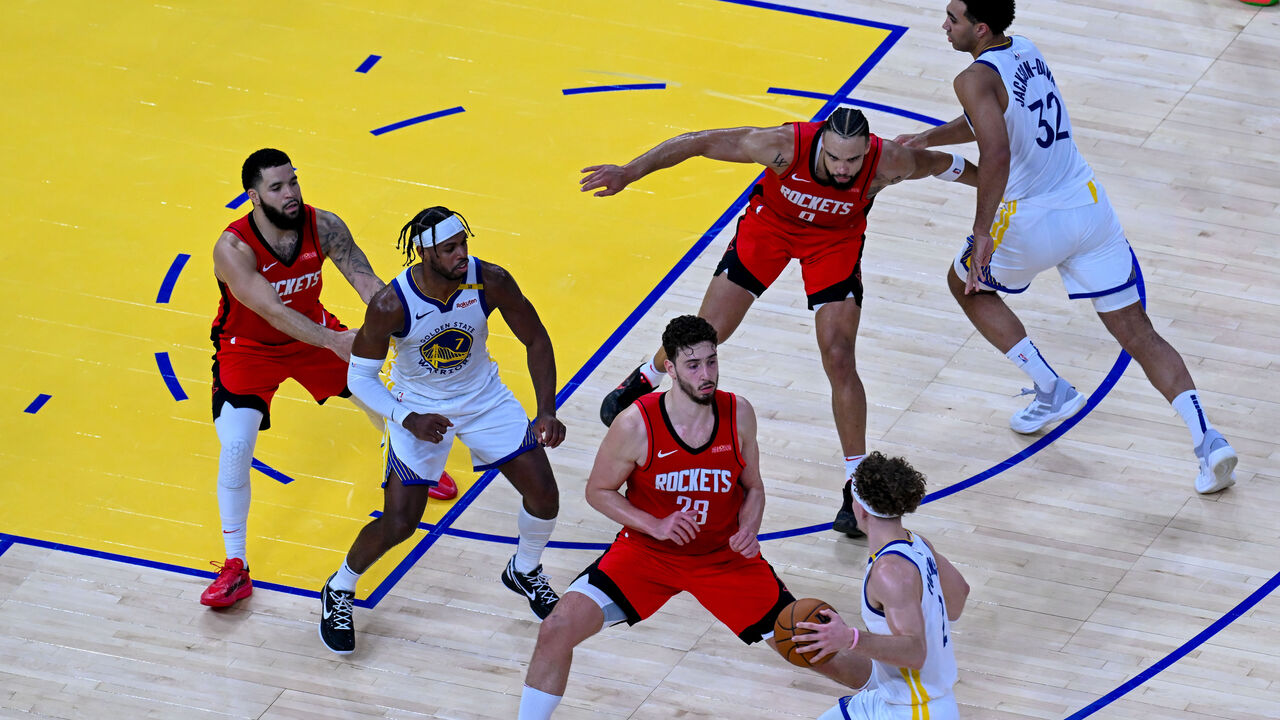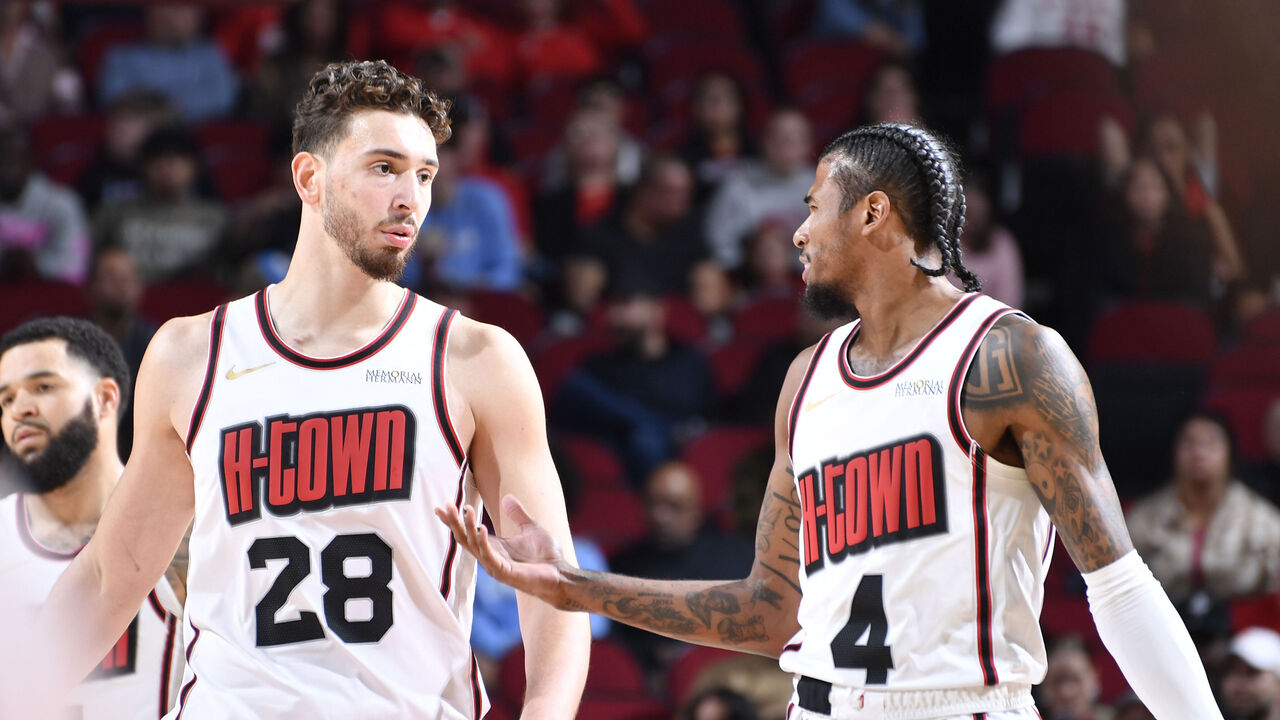How real is the Rockets' rise?
Just 20 months ago, the Houston Rockets were wrapping up a dismal 22-60 campaign, their third straight season finishing in the Western Conference cellar. Now, they're tied for second place in a West that's more competitive than it's been in years, with a 15-8 record that includes a recent statement win over the conference's top team. Their defense has gone from second-worst to second-best in the NBA in that short time, and their net rating has improved from 29th to seventh.
It's been an impressive turnaround, propelled by a great coaching hire, timely veteran free-agent signings, and tremendous internal growth. The question now is, how sustainable is the formula that's brought them so much success over the season's first six weeks? How good is this team, really?
On defense, they're legit. Nothing feels fluky at that end, where an array of long, strong, versatile defenders work in unison to execute Ime Udoka's rock-solid scheme. The Rockets tend to switch one through four around center Alperen Sengun and usually have Sengun play a high drop when guarding ball screens. They also try to keep the big man out of ball-screen action by cross-matching him onto poor-shooting wings or guards, who are typically less involved in the offense and don't force him to account for as much space.
That's important, because while Sengun has improved a lot defensively, he still has a hard time tracking both his man and the ball when guarding pick-and-roll. He's spent entire games this season guarding players like Josh Hart and Kris Dunn, sagging off them when they have the ball and providing roving help around the rim when they don't.
The Rockets can structure their scheme and matchups that way because they've got a trio of wing defenders in Dillon Brooks, Amen Thompson, and Tari Eason who can defend point guards, centers, and everyone in between. Hybrid big Jabari Smith Jr. isn't as versatile as those three, in the sense that you wouldn't want him to start a possession defending a guard, but he's a capable switch defender who can handle those assignments in mid-to-late-clock situations.
The same goes for guard Fred VanVleet at the opposite end of the positional spectrum; the Rockets won't intentionally cross-match him onto bigs the way they do with Brooks, but he's strong enough (and has good enough hands) that they're plenty comfortable with him switching onto a center and fighting to hold his ground while help shades over.

Houston has the third-best rim defense in the league, and that's thanks not only to Sengun's improvement and adjusted role but also to the ability of the team's non-centers (Thompson most of all) to protect the basket. Remarkably, that extends all the way to their 6-foot point guard, whose impact as a low belies his stature. VanVleet's ability to simply be on time and absorb a midair bump has allowed him to hold opponents to 56.8% shooting at the rim on an average of two contests per game.
Brooks is as sticky an on-ball stopper as there is. Eason and Thompson are space-eaters and gap playmakers of the highest order. Even Jalen Green, the ostensible weak link in the rotation, has made meaningful strides as a defender. Collectively, the Rockets are physical, disciplined, and connected, able to rotate on a string. They're as good as any team other than the Thunder and maybe the Warriors at applying ball pressure without getting burned on the backside. They force a lot of turnovers but don't foul a ton or give up many offensive rebounds. They surrender the league's lowest rate of opponent threes.
The concerns about them all reside on the offensive end. This is simply a terrible shooting and finishing team from every area on the floor. They rank 26th in accuracy from 3-point range (on the league's fourth-lowest attempt rate), 21st from long mid-range, 28th from floater range, 24th at the rim, and 23rd from the free-throw line. Smith is their only starter shooting better than 50% from 2-point range, Brooks is their only regular above 35% from deep, and Thompson is their only rotation player with an above-average true-shooting mark.
Add it up, and you have a team that ranks 29th in effective field-goal percentage and 25th in first-shot half-court scoring, per Cleaning the Glass. The five teams that rank below Houston in that latter category are a combined 26-80 this season.
Incredibly, the Rockets still have a league-average offense overall, thanks to a microscopic turnover rate (a feature of nearly every VanVleet team since he became a starting point guard) and a gargantuan offensive rebound rate. Their relentless glass-crashing, in particular, has a way of buoying them while wearing out and demoralizing their opponents. They're getting about six more shooting possessions per game than their opponents, the largest differential in the league, and they have a killer transition attack fueled largely by their excellent defense.
If that formula sounds familiar, you might recall that the 2021-22 Grizzlies employed something similar to win 56 games, reach the second round of the playoffs, and put a decent scare into the eventual champion Warriors despite ranking 22nd in first-shot half-court offense.
The difference, of course, is those Grizzlies had Ja Morant, and the Rockets don't have anyone in the same galaxy as an offensive engine. For that reason, it's hard to imagine them reaching those same heights. It's an apples-to-oranges comparison because Houston mainly flows through its center in the half court; Sengun ranks seventh in the league in frontcourt touches, third in post touches, and fifth among centers in average time of possession. And there are benefits to having a skilled big like him orchestrate the offense. But Sengun isn't quite at the level where he can consistently create good shots for himself and his teammates by doing so.

His touch around the basket is pretty poor (he's shooting 58% inside four feet, a 14th-percentile mark for a big), and his floater game is only OK, especially considering how many of them he takes. You'd like to see him take the ball strong to the basket more often rather than falling back on his push shot when there's a defender in his path, though you can understand the aversion given his struggles as a finisher. He's a good passer, and often a stylish one, but his value as a playmaker is more about him acing low-to-medium-risk reads than about him finding imperceptible passing windows that can wrong-foot a defense's typical rotations.
None of this is meant to knock Sengun, who's doing everything asked of him to the best of his considerable capabilities. It's just to say there's an element of necessity to how frequently the Rockets play through him, because of how lacking the team's perimeter creation is.
Green's season may as well have picked up from where last February ended, as if his great March awakening never happened. He's back to playing slightly out of control, attacking without a plan, and taking shots that aren't justified by his shot-making ability. He's improved as an interior finisher, but he's shooting just 32% from deep and an unthinkable 23% on non-rim 2-pointers. He has 62 assists against 60 turnovers. He simply hasn't looked like a capable lead guard this season.
VanVleet has been the much more reliable backcourt option, and his two-man game with Sengun continues to be the staple food of Houston's offensive diet. But he's never going to be an efficient scorer inside the arc (his current 47% mark is actually a career high), which puts a lot of pressure on a 3-point shot that hasn't really been falling this year. His 38-point outburst in the Rockets' win over the Thunder demonstrated how good this team can be with high-end offensive guard play, but you aren't going to get anything close to that level of production from VanVleet consistently.
Thompson is the team's most dangerous downhill attacker, cutter, and finisher, but as long as he's this limited as a shooter, he won't cut it as a high-volume initiator. Reed Sheppard might grow into that role one day, but the rookie looks overwhelmed and not entirely ready for the speed and physicality of the NBA game right now.
The good news is, between their heap of intriguing prospects and surplus future draft picks and swaps, the Rockets are well-positioned to swing a big trade that helps them address this clear area of need. They've already reportedly poked around the idea of going after Kevin Durant, and the specter of Giannis Antetokounmpo shimmers somewhere on the horizon, but the target needn't necessarily be a superstar. Someone like Zach LaVine, for example, could help Houston's offense immensely while being shielded by the team's defensive infrastructure.
A deal of that magnitude feels pretty unlikely this season both logistically and practically. Upsetting team continuity midseason rarely works out, and if the aim is to move Green, it makes more sense to wait until the summer anyway, when his recently extended contract won't be poison-pilled and will become much easier to trade.
For now, the Rockets can enjoy the innocent climb after years in the basement. But expectations and pressure will start to ramp up if they continue along this trajectory. And for all their positive development stories, solutions may ultimately have to come from without rather than from within.
Joe Wolfond covers the NBA for theScore.